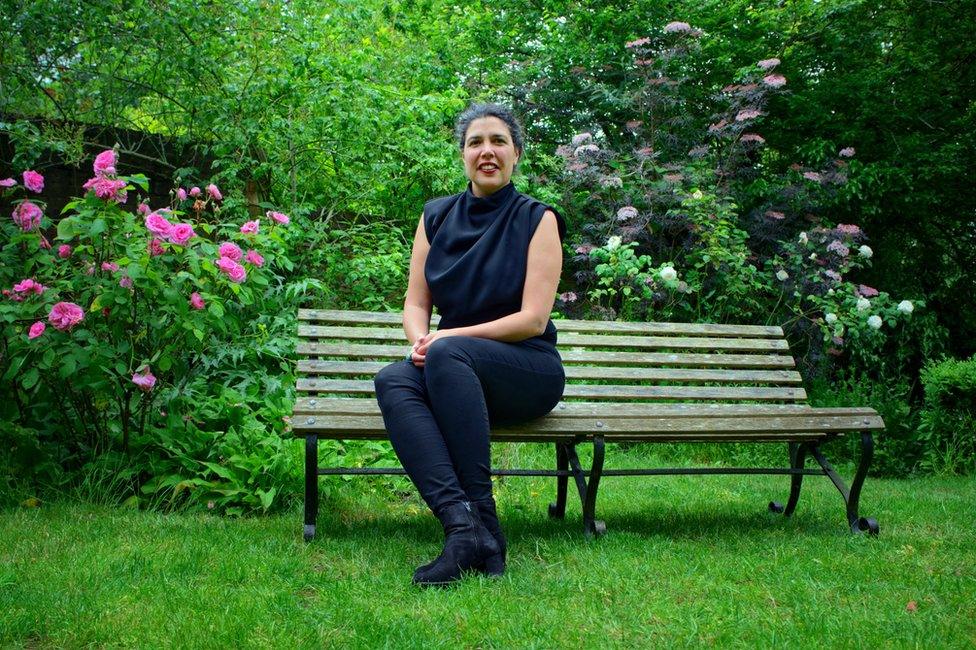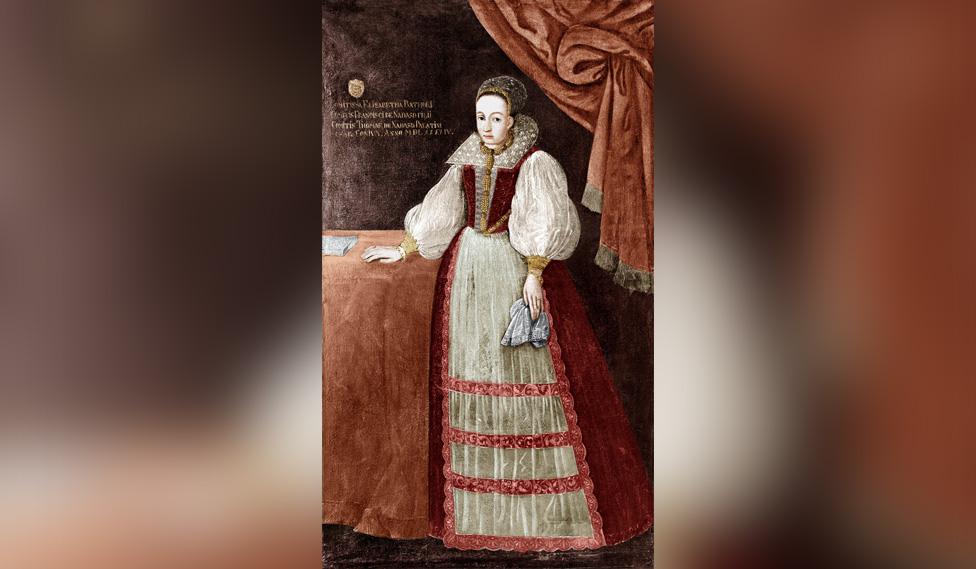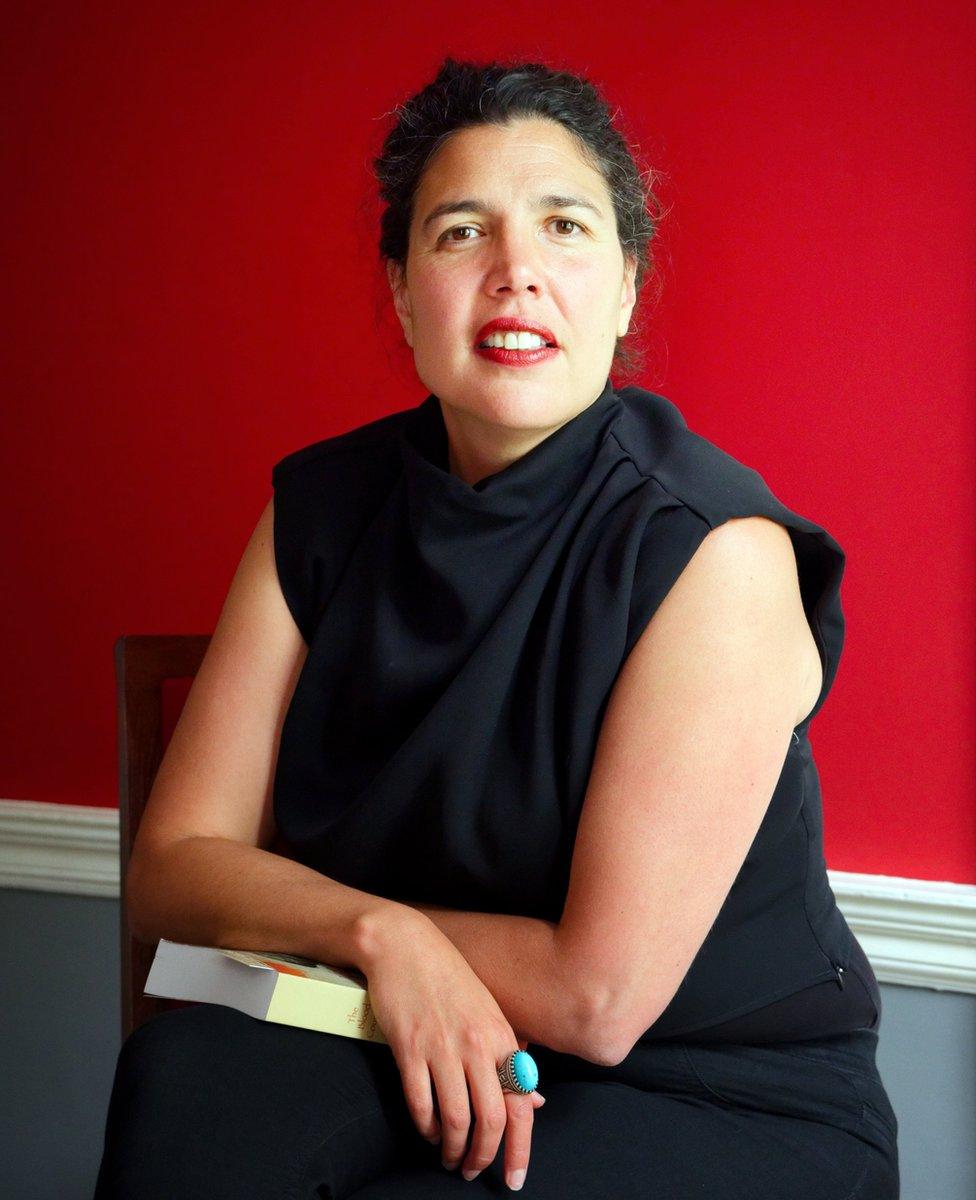Cambridge University academic's quest to clear Elizabeth Bathory's name
- Published

Dr Annouchka Bayley was working in a second-hand book shop when she came across a little black book about a 17th Century countess thought to be the most prolific female serial killer in history
More than a quarter of a century ago, a then 17-year-old Annouchka Bayley was working in a second-hand book shop when she came across a little black book about a 17th Century countess thought to be the most prolific female serial killer in history. She was instantly captivated by the story - not because of the tales of gore, torture and murder but because she sensed, even as a teenager, that the countess was the victim of a "stitch up".
Elizabeth Bathory, a Hungarian noblewoman, was allegedly a serial killer and torturer who bathed in the blood of 650 young women to keep herself young.
Her name and story might be unfamiliar to many in the UK. Far better known is the character and tale Bathory is believed to have inspired: The evil queen in the story of Snow White.
Born in 1560, Bathory (and four of her servants) would eventually stand accused of murdering hundreds of girls between 1590 and 1610.
Bathory was detained at her Čachtice Castle home in what is now Slovakia until her mysterious death in 1614.

Elizabeth Bathory, a Hungarian noblewoman, was allegedly a serial killer and torturer who bathed in the blood of 650 young women
Now an associate professor at Cambridge University, Dr Annouchka Bayley remembers her first encounter with the countess's story.
"One day we had the usual delivery when you had to put all the books out and I found myself shelving this little black book with a big grey picture of a seal on it and a dragon eating its tail," she says.
"It was called The Blood Countess: The Life and Times of Elizabeth Bathory. I think there was something about this slightly gothic vibe that drew me in.
"I remember putting it on the shelf and carried on shelving but then went back to that book, took it off the shelf and placed it under the front counter.
"While I was reading it I found myself thinking , 'hang on a minute, I don't buy any of this, this is a stitch up job'.
"She captured my interest and I did a little bit of research and found myself wondering, 'if she had killed all of these women, where were the bodies?'.
"It had a true crime feel to it and the questions just kept ticking, and ticking."
Something had to be done, the 17-year-old Annouchka remembers thinking.
"It was the injustice of it. I was angry about it.
"I thought I'm not old enough to write this," she says. "There is something here but I was self aware enough to know I was not ready to do anything with it."

Today, Bathory's former Čachtice Castle home in what is now Slovakia is a ruin
In 2019, Dr Bayley began four years of research into the countess's story.
Her findings form the backbone of her recently published historical novel, The Blood Countess.
"My gosh, she [Bathory] really took shape for me. She has been so present for me."
Dr Bayley concludes not only that the accusations against Bathory are false but that the countess was a religious subversive, a book printer and book smuggler and a radical feminist who used her vast wealth and castle home to educate vast numbers of young women and girls.
This, says Dr Bayley, made her a prime target for a 17th Century witch hunt.
"I mean, who has the time in one lifetime to, one by one, kill 650 young women?" asks Dr Bayley. "I mean she would have been a busy girl."
"I dug and I dug and all of those 650 women belonged to one particular class of young women who were basically the people who lived in that region before the Hungarians came," she says.
"They had been noble, then dispossessed of their properties, so they occupied this liminal and bizarre space and, because of the wars taking place at the time, many of the men had died so they were unmarried as well.
"You've got a bunch of unmarriageable teenage deposed noblewomen. So what Bathory did was set up a school to teach them how to read and offered them sanctuary.
"She basically sets up an institute - which is something I love because I work in education."
The historical evidence shows that, during the later investigation into Bathory, just one body was found at the castle.
There were, however, numerous reports of coffins leaving the castle grounds.
"When I went to the castle I was interested to find that there were numerous tunnels," says Dr Bayley. "And there was a printing press documented at her other castle.
"The other thing that is on record is that after Bathory's husband dies, she goes and spends today's equivalent of £26m on clothes bought from Venice," says Dr Bayley. "That's not buying for personal use, that's a business."
The evidence gathered by Dr Bayley has left her wondering whether, far from being tortured and murdered, these young women were moved away (possibly ferried away covertly inside coffins) from a region then at war into the countess's various European business interests.

Dr Bayley says Bathory's wealth, political power as a publisher and role as an educator of young women meant she needed not only to be silenced, but erased
"I'm sure some contemporary historians, and other people, will disagree with me and we will never know," says Dr Bayley.
"But when you lay it all out in one of those crazy crime evidence things, with the threads going across it, it is certainly plausible.
"Bathory is in a sense the first female self-publisher that we have on record."
This, she says, would have given Bathory immense political power.
"And that's arguably why she needed not only to be shut up, but erased from the history books and, where not erased, turned into a bogeyman.
"Lock up your daughters - because Bathory is going to come and drain them of their blood to keep her looking young."

Follow East of England news on Facebook, external, Instagram, external and X, external. Got a story? Email eastofenglandnews@bbc.co.uk , externalor WhatsApp 0800 169 1830